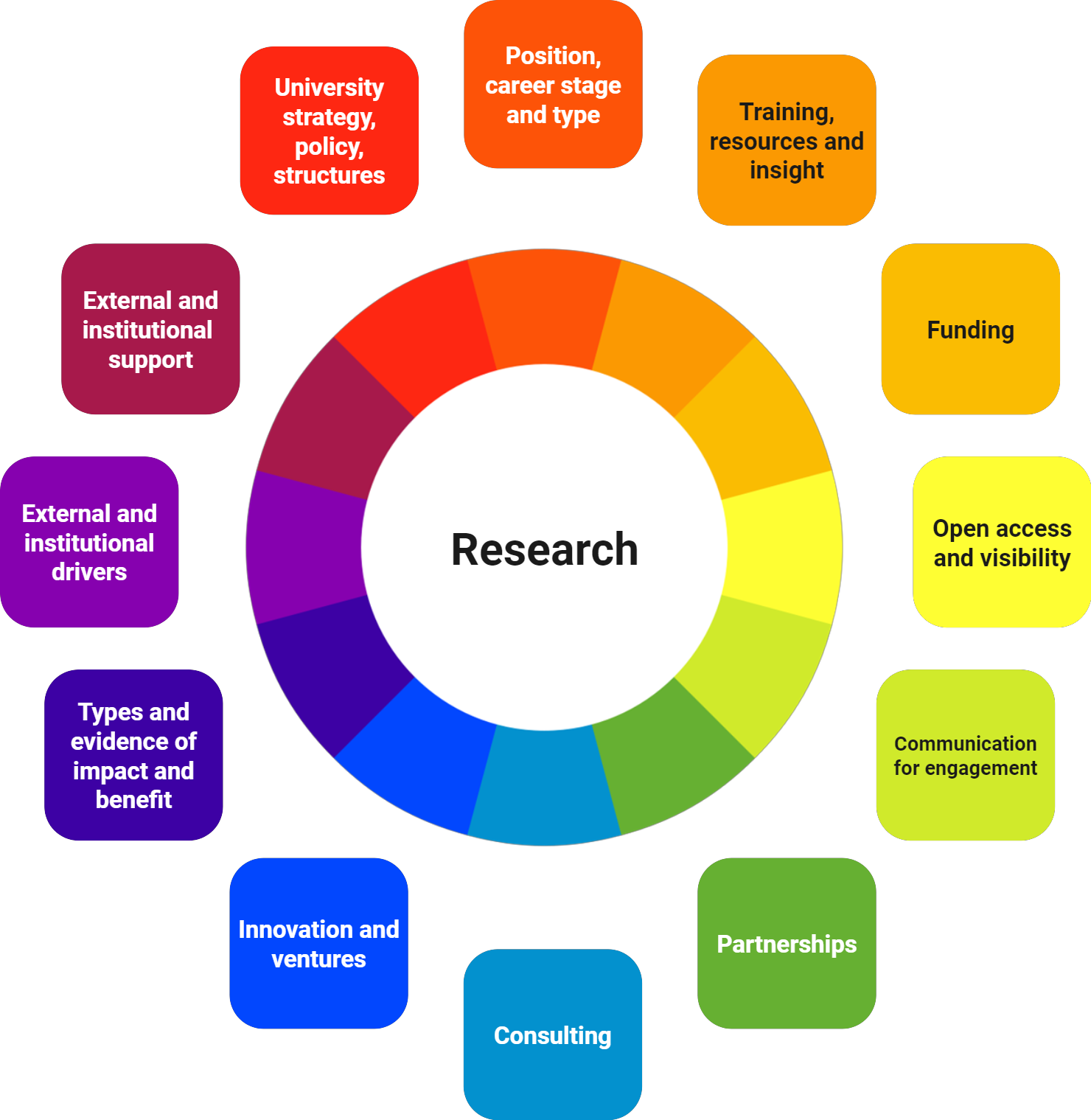Jump to: What is impact?, What isn't impact?, Engagement and impact wheel, Engagement and impact at LSE
What is impact?
Impact is the benefit brought about by research, leading to the betterment of society.
Perhaps focusing on the “benefit” is the simplest way to understand your impact. Who has your research helped? In what ways? And what evidence do you have to demonstrate this? Having clear and precise answers to these questions is a great starting point when describing the impact of your research - whether to partners, funders, colleagues, or anyone else.
And versions of these questions can also help you consider (and plan) how your research can have an impact in future. Who might my research help? In what ways? And what evidence will I need to demonstrate this? But also, and perhaps most importantly, where do I start? Any one project will have multiple answers to each of these questions and you can find in our online resources further advice, prompts, examples, and insights to help you settle on the right answers for your research.
As we get started, it’s important to note that impact at LSE is focused on benefits beyond our academic communities. No doubt your research has equally demonstrable value to your field, academic collaborators, the wider scholarship, or students. But over the past decade, in particular, “research impact” has been focused on non-academic contexts and settings and so that is the approach we’ll take here, too.
What isn't impact?
When considering the impact of your research, you might hear, read, or recognise various bits of terminology or jargon which are used to describe any of the diverse stages of the research-to-impact lifecycle. These can occasionally be confusing, so we’ve tried to be as clear as we can in defining and distinguishing between them.
Words like “dissemination”, “engagement”, “public engagement”, “knowledge exchange”, “knowledge transfer”, “knowledge mobilization” are just some of the near-neighbours of impact and vital parts of the overall story. . But none should be used interchangeably with impact. Understanding the distinctions can be really helpful as you plan your activities and work towards your impact goals.
- Mobilisation or dissemination refers to the myriad ways research or its most notable findings are shared or communicated more widely. This may mean promoting an original research article, talking about its insights, capturing its main lessons for social media, or creating a visual representation not commonly supported by traditional academic formats. This is best done with a specific purpose in mind: to foster engagement. Read more about making your research accessible and visible.
- Engagement is the stage beyond simply capturing attention with your research. It is where its findings are connected to an identified real-world need. Where a non-academic stakeholder engages you in conversations about how your ideas, data, or outputs might be applied in the context of their work or to help them solve a problem. It is best understood as a mutually beneficial process, a two-way exchange of knowledge, experience, and expertise. Activities which engage relevant people or groups, and are designed to meet their interests, needs, and priorities, are sometimes referred to as "pathways to impact". Learn more about effective engagement and how to get started.
- Public engagement is often used interchangeably with “engagement” and so the points outlined above also hold true here. Where a distinction might be drawn is in the imperative to understand who your “publics” are. There is no such thing as “the general public”; you need to know who you want to engage with your work and why. Start to think through what "public" means to your research in our impact planning guide.
- Knowledge exchange is another term often used interchangeably with “engagement” and refers to the two-way engagement of non-academic groups with research in ways intended to be mutually beneficial. It is language often used by funders to describe the vast category of activities designed to generate research impact, but is sometimes used in more narrow contexts to refer to innovation or the commercialisation of research more specifically.
 Engagement and impact wheel
Engagement and impact wheel
The engagement and impact circle helps to disaggregate the components of impactful research and the activities, roles, and expertise associated with underpinning the benefits that our research brings about. The circle simplifies what might otherwise seem like an overwhelming ‘have impact’ monolith. We hope that understanding the stepping stones along the journey to impact, breaking it down into tangible tasks, as well as identifying the ecosystem of expert support that exists to help along the way, will enable colleagues at all career stages to imagine and start out on their own pathways.
Engagement and impact at LSE
Since its foundation, LSE has worked hard to secure its position both as a global research institute and at the forefront of efforts to maximize the benefits of social science. Our commitment to addressing public problems through the advancement of social science is underpinned by engagement and impact activities, and reflected in our 2030 strategy.
LSE's Research for the World strategy aims to:
- Maintain and strengthen LSE’s position as the leading global specialist social sciences institution, through supporting and promoting research excellence across the breadth of our research interests;
- Contribute to the betterment of society through increasing the impact of our research and innovation;
- Take a leading role in ensuring that the social sciences are valued, including their vital contribution to understanding the world and how/why it changes.
Research engagement and impact is global, not restricted to the UK. LSE has an important role to play locally and globally; this is reflected in our research and should likewise be reflected in our engagement and impact activities.